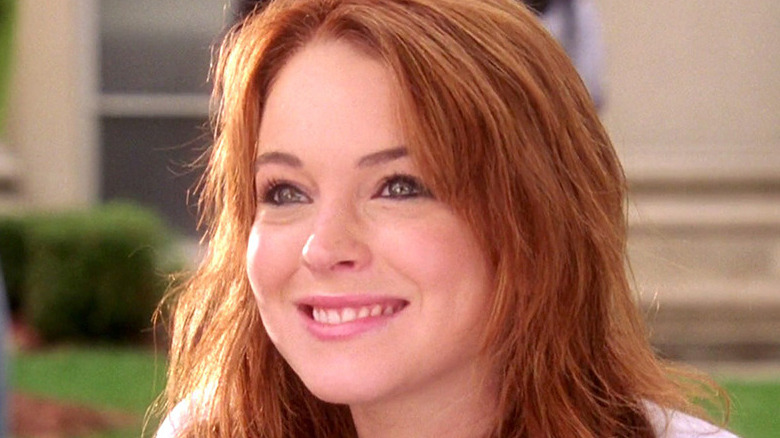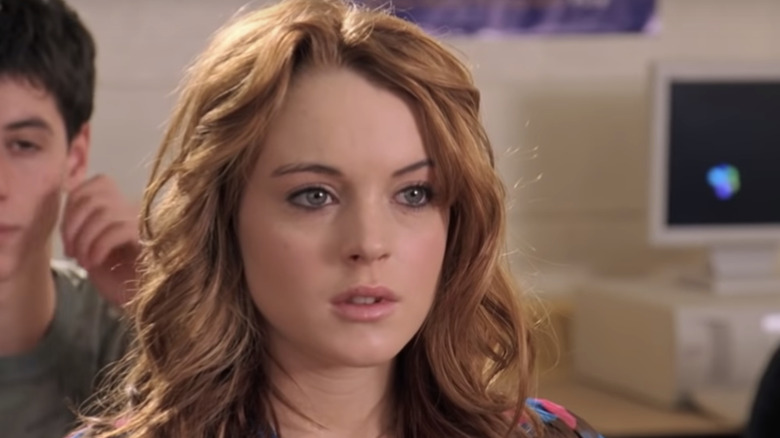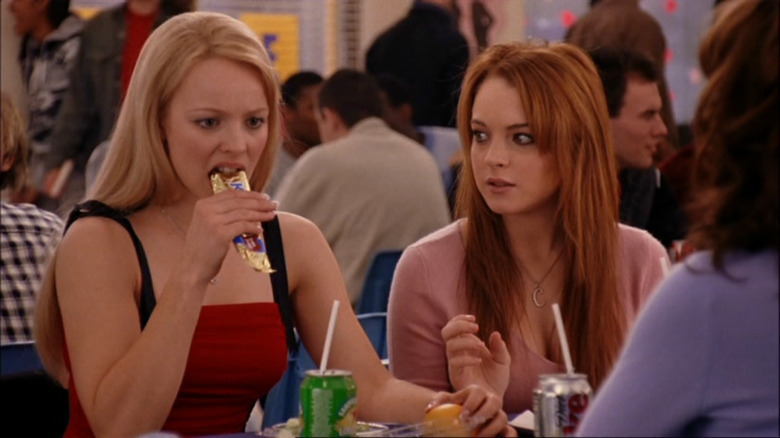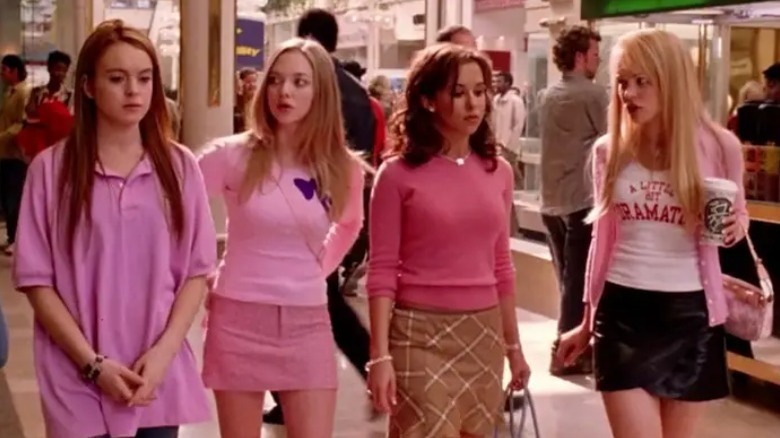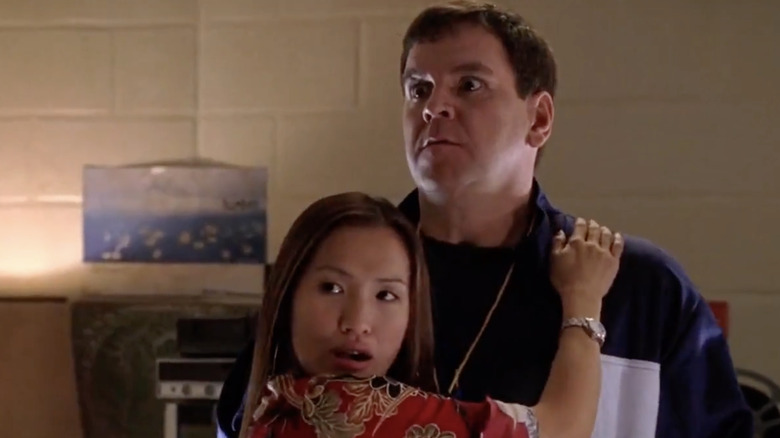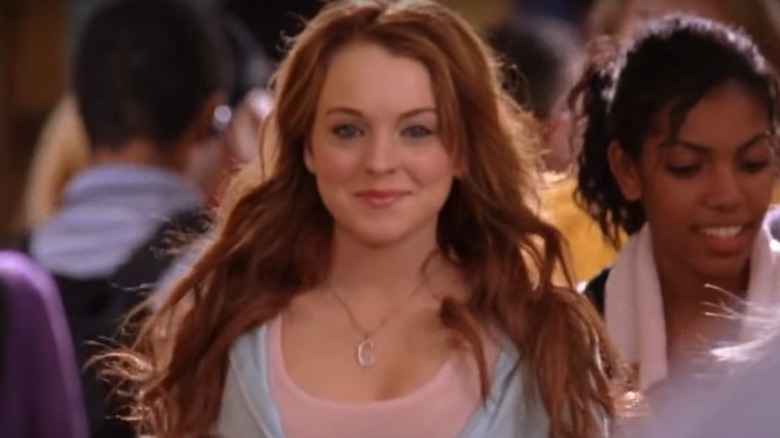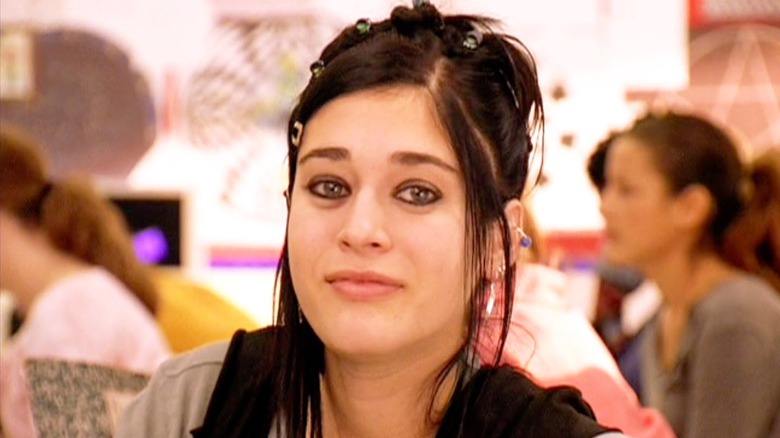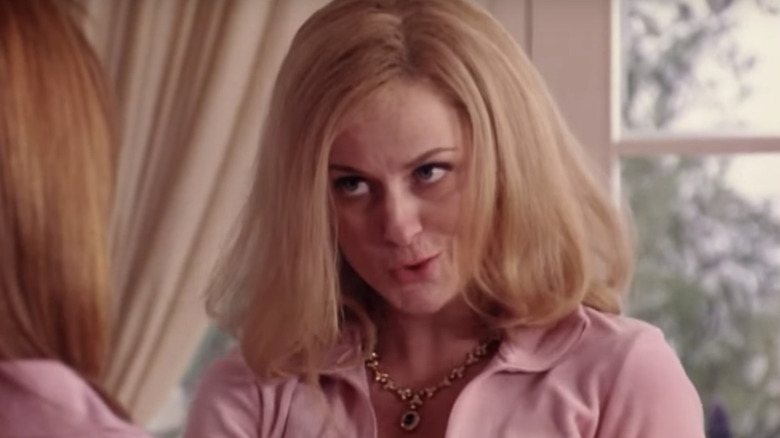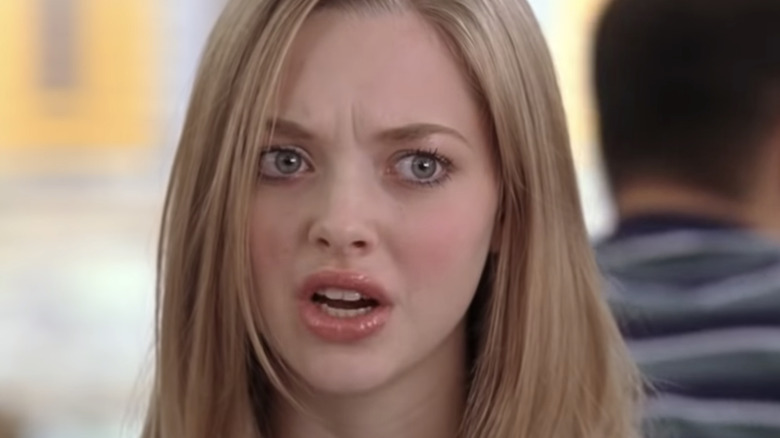Mean Girls: The 4 Best And 4 Worst Things About The Movie
As an early-2000s cult classic, Mean Girls is one of the defining movies of our preteen and adolescent years. The film, written by SNL alum Tina Fey, follows new girl Cady Heron (Lindsay Lohan) as she navigates life at her socially divided high school. Cady attempts to infiltrate the most popular group in the school, the Plastics, in order to reap revenge for her new friends. But what starts as a plot to foil the Plastics' popularity turns into a genuine longing for popularity itself.
Since debuting in 2004, the comedy has spawned a Broadway spin-off, a TV movie sequel, and more. It's also become one of the biggest influences on not just mid-2000s pop culture, but pop culture as a whole. Yet, more than a decade later, some aspects of the movie just don't hold up — from the depiction of racial stereotypes in the film to the way it handles on weight gain. Let's take a look at the best and worst things about Mean Girls.
Best: Some topics still hold up
It's no secret that our current political and social climate is, well, complicated. Citizens and government officials of different viewpoints have pit themselves against each other in hateful ways, similar to scenes in Mean Girls. "The movie was about relational aggression among women ... But now that behavior has really metastasized across our society, and you see it everywhere. You see it in people being horrible to each other on social media," writer Tina Fey told Variety in 2018.
In fact, the tumultuous present has influenced the Mean Girls musical adaptation for Broadway. Erika Henningsen, the actress who plays Cady Heron in the musical, spoke to USA Today about the late-2010s ideology that has been carefully woven into the performance. "There's a (new) wonderful scene in the musical where Regina tells Cady, 'You don't have to apologize for being a badass. You have to apologize when you tear somebody else down because of it. But you should never apologize for your worth and your strength.' ... And that's sort of been the new development ... of the show's message for today."
Worst: Weight gain as a major plot point
Weight gain is a major plot point in Mean Girls — and for all of the wrong reasons. In an attempt to make mean girl Regina George "lose" her popularity status, Cady Heron, with the help of her friends Janis and Damien, convinces Regina to consume Swedish nutrition bars that, unbeknownst to Regina, makes people rapidly gain weight.
Cady's plan to ruin Regina's "hot bod" — and, eventually, her popularity — through weight gain is more than problematic. As explored in "Relational Aggression on Film: An Intersectional Analysis of Mean Girls", the female characters in Mean Girls use their bodies as their "best weapon." In fact, when Regina George ends up gaining a significant amount of weight, she is shunned from her lunchroom table for wearing sweatpants on a Monday, even though they're the only thing that fit her. In other words, weight gain, the wrong outfit, or a bad hair day are shown as having the potential to ruin a girl's social status in the film.
Best: The costumes are absolutely iconic
Mary Jane Fort is a name you probably haven't heard before. But as the mastermind behind Mean Girls' costume design, she's worth getting to know. Fort began with countless hours of research — flipping through high school yearbooks, magazines, and more. Yet, with the film being set in the then-present day, and production occurring one year prior, Fort had to look into the future to predict upcoming fashion trends.
Fort also wanted the Plastics (Regina George, Gretchen Wieners, and Karen Smith) to appear more put together than other characters. "They're the fashion dictators of the school, and we wanted them to be more like the brightest, shiniest ball on the Christmas tree," Fort told Nylon in 2014. In order to achieve this look, Fort mixed in the tidy fashion elements of the mid-1900s. "In the '50s your nails were done, your hair was done, and your dresses were impeccable. So it was a little bit of a combination of the future and the past and have it a contemporary feel," said Fort.
Worst: The lack of racial diversity
One of the prime examples of racial stereotyping in the film happens within the first couple of scenes. Janis is shown explaining the school's social hierarchy, stating, "You've got your freshmen, ROTC guys, preps, JV jocks, Asian nerds, cool Asians, varsity jocks, unfriendly black hotties, girls who eat their feelings..." Any non-white group is called out by their race, a tactic called "othering" that, according to "An Intersectional Analysis of Mean Girls," is used to define white skin as the "norm."
Perhaps the most memorable example of racial stereotyping is the scene where Coach Carr, the high school gym teacher, and a female Vietnamese student, Trang Pak, are caught hooking up in a storage room. Later on, both Pak and another female Vietnamese student, Sun Jin Dinh, are depicted fighting over Coach Carr. According to the article, these scenes help to perpetuate a colonial fantasy in which a white man has control over the sexual behavior of Asian women.
Best: The Mean Girls storyline transcends film
As we've said, Mean Girls has gone from a film to a Broadway musical production. Screenwriter Tina Fey was told for years that the movie would make a great musical. Then, one day, she decided to give it a shot — but she insisted on writing it herself. After five years and the help of composer Jeff Richmond (Fey's spouse), the musical was finally ready for a trial run.
"We initially fell into the trap of making it all sound like pop music, because it was girls in high school," Richmond told Variety. Only when Fey and Richmond began to consider the wide range of personalities found in a high school environment did the musical score further develop.
So, how did Mean Girls the musical do? In the first week of performances, the show sold out each night and grossed over $1,320,000. Now that's so fetch.
Worst: How Janis' perceived sexuality isolates her
Janis Ian's disdain for Regina George is no secret throughout the film. Through a handful of scenes, viewers find out that Janis' hate began in middle school when Janis and Regina were friends. Regina discloses that she believed Janis to be a lesbian and uninvited her from a middle school party because of it. From there, Regina fueled a rumor about Janis' sexuality that would follow her into high school and completely terminate their friendship. In the film, the word "lesbian" is used as a weapon against Janis, independent of whether or not it is her true sexual orientation.
Mean Girls never gives us a direct answer about Janis' sexuality, but one thing is certain: Janis' perceived sexuality, and subsequent departure from the social norm, led to her social outcasting in the film. Furthermore, Janis' only other friend is Damien, a gay man. This nuance continues to point out that those who deviated from heterosexuality in the film were marginalized and came together.
Best: Amy Poehler... enough said
Mean Girls director Mark Waters has had an affinity for actress and comedian Amy Poehler since her early days on Saturday Night Live. So, when she was recommended to join the cast, he was nothing short of thrilled. "When Tina said, 'Amy would be really good for this if you're interested,' I was like, 'Are you kidding me? Let's f**king get Amy!'" detailed Waters in an interview with Vulture.
Yet, according to Waters, Paramount Pictures, the film company that produced Mean Girls the movie, was unsure about casting Poehler in the film. "They'd been burned on some Saturday Night Live movies ... so they didn't want many Saturday Night Live actors in Mean Girls, because then it might feel like an SNL movie and people might shy away from it," said Waters.
Fortunately, his reasoning with the studio proved to be a success. Poehler was cast as Mrs. George, the wildly inappropriate yet somewhat charming mother of Regina George — despite, in real life, being only seven years older than Rachel McAdams, the actress cast as Regina.
Worst: Karen's stupidity
"At first, I did Mean Girls, and I was pigeonholed as this dumb blonde. I had opportunities, but not as many as I do now," confessed Amanda Seyfried in a 2015 interview with PopSugar. In fact, speaking with Peter Oberth, Seyfried said she experienced the same characterization in high school. "I was always being made fun of for being really dumb, but ... I wasn't," stated Seyfried.
The issue of stupid female characters goes beyond Seyfried's typecasting. All too often, female characters are depicted as less intelligent or dim-witted for a cheap laugh. For example, Seyfried's character, Karen, asks, "If you're from Africa, why are you white?" and says, "I must have ESPN or something," when talking about her knack for predicting the weather. Furthermore, for a portion of the movie, Cady pretends to be bad at calculus in order to impress her crush, Aaron Samuels — and eventually begins to fail, despite actually being good at math.

